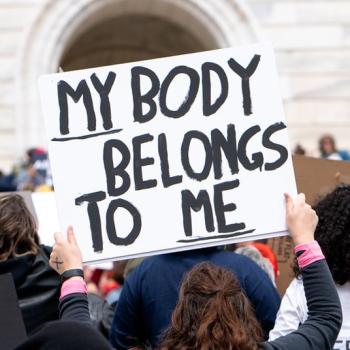Meet Barb, a single, attractive woman in her late 20s. Barb and a few friends decide to take an exotic, tropical vacation to Thailand. There, they stay at a beach hotel and have a glorious time swimming, exploring, and partying.
One night, Barb has a little too much to drink and, against the objection of her friends, accepts a ride back to the hotel from a local Thai man in the bar.
On the way, he stops the car, pushes her out, and rapes and robs her, leaving her in a seedy part of town. His face and the alley where it happened are burned into her memory.
Eventually, she finds her way back to the hotel, traumatized.

Barb and her friends go immediately to the police station to report the crime. After a trip to the hospital, she stays in her room the rest of the day with the door locked, just trying to breathe. The police call her later that day and ask her to come in.
“Is this the man?”
It’s him – she’d know that face anywhere. Barb is relieved, and the weight of utter vulnerability lifts from her shoulders.
“What now?” she asks the police officer. “Will he go to prison?”
The officer takes a deep breath and tells her, “our law says that his punishment will be waived if he is willing to marry you. He is willing. Are you?” He added, “If you are not, he will go free.”
Barb is subject to marry-your-rapist law, as hideous as it is, just because she happened to be in Thailand when she was violated.
Meet Solada, a Thai woman, the same age as Barb. She has a tenth grade education, and works as a farm laborer.
One evening, on her way home from the field, she too is raped.
Solada also reports the crime to the police, and they find the perpetrator. This man also asserts his willingness to get married and let bygones be bygones.
(Commercial: if you question “business as usual” in Christianity – or want to question it – subscribe to my newsletter, and we can journey together!)
Now meet Angela. Angela lives in Laredo, Texas. She is the same age as Barb and Solada, and she is raped by an acquaintance. When Angela finds out she’s pregnant, she has very few options.
Angela is handed a life sentence: she must have the baby, and the trajectory of her life will be forever altered.
Her rapist is completely off the hook.
Of course Barb does not marry the man. She leaves Thailand with relief, but will carry the emotional scars for the rest of her life – and worry whether he will rape other women.
When Barb gets home to San Antonio, Texas, she tries to pick up where she left off, but soon discovers that she is pregnant. In a flash, her whole life changes, and not for the better.
Barb and Angela are twice-victimized. First, they are raped. Then, they are punished for a deed committed by someone else – someone whose identity is known.
Both women are victims not just of their rapists, but of the laws where they live.
And both of their perpetrators are completely off the hook.
What about Solada, the Thai woman? She does not marry her rapist, but she has more options than the American women in Texas.
That’s right, a poor, high school dropout in a third-world country, working on a sugar cane farm is freer in this situation because she has choices. It is legal in Thailand to terminate a pregnancy up to twelve weeks.
Marrying one’s rapist does not heal the trauma or erase the memory. It punishes the victim for life and exonerates the perpetrator. It pretends to make the best of an unfortunate situation – but really, is a lifetime bond with a rapist “best” in any sense of the word? It tries to create a facade of respectability where there is only dishonor – but is this facade more important than the actual life of the woman living behind it?
Similarly, forcing a woman to carry a pregnancy begun in an act of violence and cruelty is not a solution. The policy masquerades as a way to bring something good out of something awful – but “good” is in the eyes of the woman living with the result for the rest of her life, not in the eyes of male legislators.
Focus on the Family (which has plenty of males in leadership) has a creative rationale for keeping such a pregnancy: “for rapists, pedophiles, sex traffickers – abortion is a valuable asset.” No, it’s not. These criminals don’t care what happens to their victims. A pregnant woman (or girl) will not deter them. They will find someone else.
Perhaps the Texas anti-abortion law was put in place in an attempt to scare young women into chastity (we know the same is not expected of young men) by punishing those who “defile themselves.”
Or perhaps the law is a just way to keep Democrats out of Texas, lest it change from red to blue.
A baby born of rape is, of course, as precious as every other baby. And a woman who is raped should be as precious as every other woman. If men are allowed to overpower women without penalty, at least women should be empowered afterwards to choose what will happen next.
We must never presume that the decision to keep or terminate a pregnancy is easy for the woman whose body and life are to be forever altered by it – but it should be her decision, and hers alone.
(If you are energized by challenges to the evangelical status quo like this, you’d enjoy my blog. Sign up for my free newsletter here!)
(If you would like to comment, please pop over to my Facebook page. All of my posts are there and open to constructive comment! I welcome your thoughts.)
OTHER POSTS THAT MIGHT BE OF INTEREST:
Pro-birth, Pro-life, Pro-choice, Part One
Pro-birth, Pro-life, Pro-choice, Part Two: contraceptives and all that jazz
Pro-birth, -life, -choice, Pt 3: Permission to defect from anti-abortion party
How to be Christlike on the abortion issue
FEATURED IMAGE: “Court Gavel – Judge’s Gavel – Courtroom” by weiss_paarz_photos is licensed under CC BY-SA 2.0













